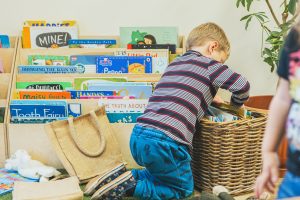 It’s is our belief that children should have the freedom to express themselves in a way that best suits them. It is our job to provide them with varied rich opportunities to promote and enable them to create and think critically using the resources they have around them.
It’s is our belief that children should have the freedom to express themselves in a way that best suits them. It is our job to provide them with varied rich opportunities to promote and enable them to create and think critically using the resources they have around them.
We believe that enabling children to explore the use of media and materials to express and create, alongside developing imaginative minds can in turn build strong unique motivated learners.
Some simply ideas for you to do at home;
- Painting with a variety of objects to include sticks, fruit and veg
- Playdough vegetable monsters
- Using different materials and building dens
- Painting ice cubes
- Leaf painting
- Listening to a variety of music and dancing together
- Playing with empty boxes
- Playing puppets and adding a narrative
- Dressing up in grown up clothes, shoes jewellery
- Messy play explorative play with baked beans, jelly , spaghetti, pasta, dried coloured rice
- Cutting, sticking with old newspapers, magazines and leaflets
Activities
Ideas to try at home in the great outdoors
- Chalking on the paths or walls
- Measuring trees
- Making mud pies
- Playing ball
- Collecting wood & twigs
- Playing with sticks
- Leaf rubbing
- Bark rubbing
- Wellie walks
- Puddle jumping
- Painting with a bucket of water on walls and fences
- Spotting signs
- Digging
- Riding scooters and bikes
In recent years due to the cultural shift in our society we have reduced the access to outdoor play for young children. However, we know in early years that regular opportunities for sustained play in a rich and stimulating outdoor environment can benefit young children
 Try at home activity
Try at home activity
Playdough Recipe (Not for eating)
- 2 cups of plain flour
- 1 cup of salt
- 2 cups of water
- 2 tablespoons of water
- 2 tablespoons of vegetable oil
- 2 teaspoons of cream of tartar
Method
- Place all the ingredients in a pan.
- Cook on a medium heat stirring all the time
- The mix will form a dough.
- Allow to cool.
- Knead into a ball.
Gardening for kids
Action Songs and Rhymes
Nursery rhymes are a fun way to teach your children about music, rhyme and language.
Teach your kids the lyrics to your favourite nursery rhymes and they’ll remember them forever. Below are just a few examples of some fun rhymes to learn and sing.
- Head, shoulders, knees and toes.
- Sleeping bunnies
- Here we go round the mulberry bush
- If you’re happy and you know it.
- Shaky, shaky, shaky.
- Old MacDonald.
- Wheels on the bus.
- Brum, brum, chicka chicka.
- Can you play-I am the music man
- Isn’t it funny how a bear likes honey.
- Ring a ring a roses.
- Okey cokey.
- Miss Polly.
- Farmers in his den.
- Dingle Dangle scarecrow.
- The big ship sails on the Alley Alley 0.
- Row, row, row your boat.
- The bear walked over the mountain (He’s a jolly good fellow).
- Looby Loo
- The grand old duke of York
- Wind the bobbin up
- Down in the jungle
- Everybody do this
Music ideas for 3-5 year olds
- Sing spontaneously in a range of different ways, alone and with others
- Learn to sing quickly, quietly and loud!
- Learn lots of nursery rhymes
- Dance around to music with your children
- Clap along to different music
- Listen to a whole variety of music.
Reading and maths
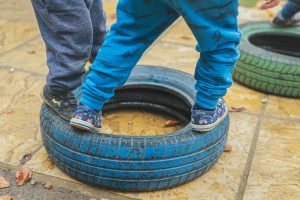 Reading and Maths development at caterpillars is a huge area that we feel very enthusiastic about. Children need to be curious and confident about their mathematical knowledge and language.
Reading and Maths development at caterpillars is a huge area that we feel very enthusiastic about. Children need to be curious and confident about their mathematical knowledge and language.
All of our activities are fun and easy to do at home as well as in our setting. The children enjoy joining in all sorts of fun and constructive activities.
Some things to try at home are:
- Stacking bricks and beakers,
- Recognising lots of cars or just a few,
- Discovering that objects are the same or different,
- Practising full & empty and all gone,
- Learning first number names,
- Using simple counting songs & rhymes,
- During sessions children use facilities to promote learning in different situations.
Numbers
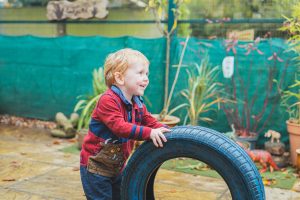 Numbers can provide a lot of entertainment for small children. They first become aware of the sounds of numbers, then they begin to understand what they mean. Finally, they need to recognise them when they are written down. There are four main skills that children need to develop before they can count. Follow the links to see these explained and how you can help.
Numbers can provide a lot of entertainment for small children. They first become aware of the sounds of numbers, then they begin to understand what they mean. Finally, they need to recognise them when they are written down. There are four main skills that children need to develop before they can count. Follow the links to see these explained and how you can help.
- Recognition of the sounds of the numbers.
- The understanding of one-to-one correspondence.
- The understanding of “How many are there?”
- The number of objects is the same however they are arranged.
Our Forest School Sessions are Free
Forest school allows children to take risks and attempt new challenges that they would not face in the classroom. This adds a sense of excitement and adventure for the children, who are free to explore, manipulate their environment around them using all their senses.
The weather has no impact upon forest school, rain, shine, snow or wind, children can make the most of their experiences.
The environment is risk assessed and safety is paramount. Forest school promotes all area’s of learning, and makes children physically filter thus providing a healthy lifestyle.
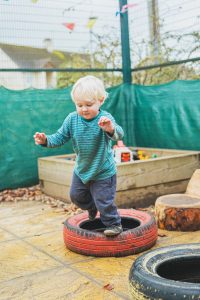
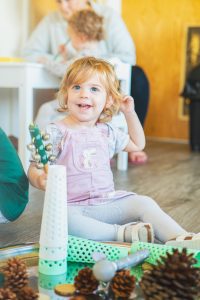
Physical Activities and Development
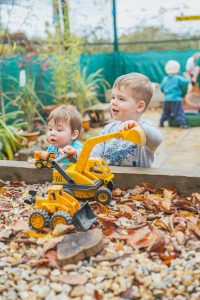
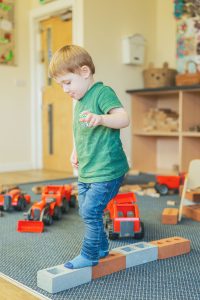
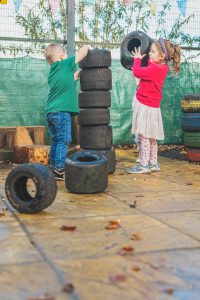

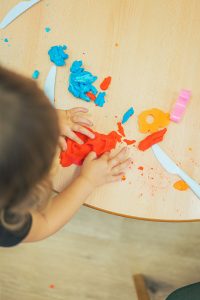 Try at home activity
Try at home activity